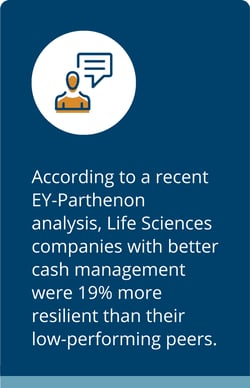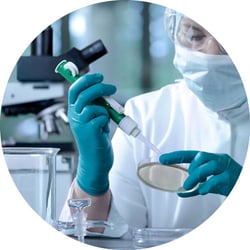
At the start of the COVID-19 pandemic, the Life Sciences industry experienced an unprecedented boom, as companies raced to fulfill the need for testing, vaccines, and treatment.
But circumstances have shifted significantly since then, presenting those companies with fresh challenges. Today, many are grappling with increased competition, changing regulations, and economic uncertainty.
Operating in this new environment demands not only increased funding but also the ability to secure it, which has grown increasingly difficult due to investor concerns over economic conditions. This presents a particularly daunting task for smaller firms and start-ups.
 For executives navigating these uncharted waters, a recent report by EY-Parthenon offers valuable insights. It suggests that Life Sciences companies that prioritize cost containment and agility are better positioned to succeed amidst economic and legislative challenges.
For executives navigating these uncharted waters, a recent report by EY-Parthenon offers valuable insights. It suggests that Life Sciences companies that prioritize cost containment and agility are better positioned to succeed amidst economic and legislative challenges.
In this blog, we’ll highlight several strategies for streamlining your operations and curbing costs to boost your financial resiliency.
Understanding the Need for Resiliency in the Life Sciences
In the dynamic landscape of the Life Sciences industry, resiliency has become a critical factor for success. Several market dynamics and challenges underscore the necessity for Life Sciences companies to prioritize resiliency, including:
Regulatory Changes
The Life Sciences sector is highly regulated, with rules and guidelines constantly evolving. Changes in regulation can have a profound impact on product development, manufacturing processes, and market access. Companies that fail to adapt quickly to these changes can face significant setbacks and compliance issues, making regulatory resiliency crucial.
Supply Chain Disruptions
The COVID-19 pandemic exposed vulnerabilities in global supply chains, affecting the availability of critical materials. Life Sciences companies depend heavily on a complex web of suppliers and partners, making them susceptible to disruptions. Establishing resilient supply chains is essential to ensuring uninterrupted research and production.
Competition and Innovation
The Life Sciences industry is marked by fierce competition and rapid technological advancements. Companies must continually innovate to stay ahead. Those who lack resiliency in their research and development processes may struggle to keep pace with competitors, leading to a loss of market relevancy and profitability.
Companies that don’t respond swiftly to these challenges risk losing their customer bases to more agile and resilient competitors. This erosion of market share can have long-lasting effects on revenue and reputation.
The Role of an Effective Operating Model in Achieving Resiliency
For many Life Sciences companies, a lack of structure leads to poor inventory management, rushed processes, and fear-based decision making. This often results in wasted spending, which is unsustainable – particularly in the early stages of business.
By adopting a different mindset and introducing structure and process into your operations, you can achieve several benefits, including financial resiliency.
An effective operating model is a well-structured and strategically designed framework that outlines how you organize and manage operations to achieve your goals and objectives. Defining such a model requires careful consideration of factors such as regulatory compliance, supply chain management, and quality control.
Implementing an effective operating model helps build financial resiliency by streamlining processes and workflows, reducing operational redundancies and inefficiencies. This, in turn, enhances productivity and reduces operational costs.
By bringing high-quality products to market quickly and efficiently, you can also gain a competitive advantage, expand your market share, and improve your reputation within the industry and among stakeholders.
Download our white paper, An Effective Lab Operations Program Will Make You More Fundable, which offers sound advice for improving your lab’s operational efficiency and attracting ongoing investment.
Strategies for Streamlining Your Operations
When developing or updating your operating model, creating efficiencies should be your top priority. There are several ways to streamline your operations, and focusing on inventory management is the perfect place to start.
Implementing a Robust Inventory Management Program
In an industry that’s driven by precision, effective inventory management can significantly contribute to your financial resiliency. Efficient inventory management minimizes waste by preventing items from expiring or becoming obsolete. Not to mention, it helps eliminate excess stock and reduce storage costs, freeing up resources for other critical activities.
 An organized inventory management system also allows for better planning and procurement. You can negotiate bulk purchase agreements, benefit from volume discounts, and reduce rush orders.
An organized inventory management system also allows for better planning and procurement. You can negotiate bulk purchase agreements, benefit from volume discounts, and reduce rush orders.
To implement an inventory management program in the lab:
- Assess Current Inventory: Begin by conducting a thorough assessment of your existing inventory. Categorize items, noting their quantities, expiration dates, and usage frequency. This will provide a baseline understanding of what you have and what you need.
- Set Clear Policies and Procedures: Develop clear and comprehensive inventory management policies and procedures covering procurement, storage, labeling, tracking, and disposal of materials. Make sure all lab personnel are trained in these protocols.
- Standardize and Centralize: Standardize lab supplies to minimize variations and reduce the number of different items you need to stock. Designate a single person or department that will be responsible for monitoring and replenishing supplies.
- Conduct Regular Audits: Implement regular audits to reconcile physical inventory with records. This helps identify discrepancies, reduces the risk of overstocking and understocking, and ensures regulatory compliance.
In times of economic uncertainty, an effective inventory management program can make all the difference by providing greater control over your expenditures. You can allocate funds more strategically, mitigating the financial risks associated with volatile markets.
Redesigning the Workforce for Agility
Life Sciences companies operate at the forefront of scientific discovery, where rapid advancement and breakthroughs are the norm. An agile workforce is essential in this context, as it enables you to adapt to new research priorities, regulatory changes, and emerging technologies.
Leaders can promote agility by demonstrating fluidity in their decision making and encouraging innovation and risk-taking among employees. Scientists, researchers, and technicians should feel empowered to share knowledge and collaborate across teams to accelerate the pace of discovery.
Providing an environment with the infrastructure, equipment, and resources in place to adequately support employees is crucial to achieving this goal. A science-ready lab is supported by the processes, procedures, training, and materials management practices necessary for scientists to conduct experiments in an efficient and timely manner.

Is your lab science-ready? Our Science-Ready Assessment (SRA) scores 29 factors across four critical areas of your lab operations to determine your lab’s current state of readiness. Schedule your assessment today!
To ensure seamless operations in the lab, you may need to rely on external talent sources. Many companies are now turning to third parties for lab support as their operations become increasingly complex. These providers can help manage lab resources, such as equipment and inventory, which are vital to the success of research outcomes.
Allocating third-party resources to lab management not only frees up scientists to focus on core tasks, but also enables them to pivot swiftly in response to unexpected challenges and capitalize on unforeseen opportunities.
In today's competitive environment, resiliency is more than just a buzzword; it’s a strategic imperative. By embracing structure and process in your operating model, you can ensure a more productive and cost-efficient future – setting you up for continued success in your endeavor to create innovative therapies that positively impact human health and well-being.
Flagship Lab Services is a leading provider of scalable laboratory support services for the Life Sciences industry.
We specialize in integrated lab support and facilities maintenance to meet the requirements of Biotech companies as they progress from R&D through GxP.
For more information about our comprehensive lab support services, visit our lab services page.





Leave a Comment